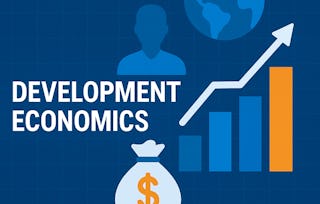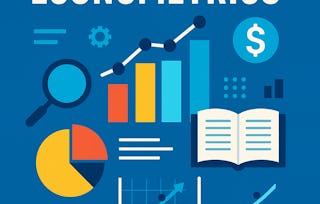Within this course you will cover key topics in development economics, in particular poverty, social protection, human capital, access to financial services, and income generating activities (labor, entrepreneurship, agriculture). In analyzing these topics, you will apply a variety of micro-economic theoretical tools and empirical methods using real-world case studies taken from around the developing world. We will consider what policies work to improve the well-being of vulnerable populations.

Development Economics

Recommended experience
What you'll learn
Understand the central policy issues in development economics and the current state of research
Critically analyze and evaluate policy options available to address contemporary issues in developing countries
Apply standard empirical tools and econometric techniques to evaluate the impact of public policies
Apply micro-economic theoretical models to understand key economic problems in developing countries
Skills you'll gain
Details to know

Add to your LinkedIn profile
24 assignments
See how employees at top companies are mastering in-demand skills

There are 5 modules in this course
This module will enable you to gain a comprehensive understanding of the multifaceted nature of development, exploring the evolution of poverty over time, acquiring the skills to measure poverty and appreciate essential features of the economic lives of the poor, mastering the concept of poverty traps.
What's included
17 videos14 readings8 assignments1 discussion prompt
By the end of this module, you'll understand conditional cash transfers for poverty reduction and human capital investment, distinguishing between conditional and unconditional cash transfers and analyzing their respective behavioral effects. You will also acquire the ability to articulate the defining characteristics of the graduation approach and apply micro-econometric techniques to assess its impacts on household poverty and wellbeing.
What's included
15 videos4 readings3 assignments
By the end of this module, you will understand key statistics on human capital in developing countries, assess the relationship between education and productivity, analyze barriers to academic achievement, and make policy recommendations to improve education for disadvantaged populations.
What's included
17 videos7 readings2 assignments1 discussion prompt
By the end of this module, you'll understand the market failures that affect poor people's access to credit and analyze how different financial institutions address these constraints. You'll also evaluate the impact of microfinance and explore the demand for savings among the poor, including the use of mobile money. In addition, you'll understand the need for insurance in developing countries, identify market limitations, and evaluate strategies to improve insurance access for the poor.
What's included
13 videos17 readings5 assignments1 discussion prompt
By the end of this module, you will be able to critically evaluate empirical findings related to rural-urban labor migration, micro-enterprise growth, and agricultural technology adoption, applying micro-economic theory to comprehend essential policy challenges, and gaining valuable insights into the primary income-generating activities in developing countries, including casual labor, micro-enterprises, and agriculture.
What's included
12 videos13 readings6 assignments1 discussion prompt
Instructors


Offered by
Explore more from Finance
 Status: Preview
Status: PreviewO.P. Jindal Global University
 Status: Preview
Status: PreviewO.P. Jindal Global University
 Status: Preview
Status: PreviewErasmus University Rotterdam
 Status: Preview
Status: PreviewO.P. Jindal Global University
Why people choose Coursera for their career

Felipe M.

Jennifer J.

Larry W.

Chaitanya A.

Open new doors with Coursera Plus
Unlimited access to 10,000+ world-class courses, hands-on projects, and job-ready certificate programs - all included in your subscription
Advance your career with an online degree
Earn a degree from world-class universities - 100% online
Join over 3,400 global companies that choose Coursera for Business
Upskill your employees to excel in the digital economy
Frequently asked questions
To access the course materials, assignments and to earn a Certificate, you will need to purchase the Certificate experience when you enroll in a course. You can try a Free Trial instead, or apply for Financial Aid. The course may offer 'Full Course, No Certificate' instead. This option lets you see all course materials, submit required assessments, and get a final grade. This also means that you will not be able to purchase a Certificate experience.
When you purchase a Certificate you get access to all course materials, including graded assignments. Upon completing the course, your electronic Certificate will be added to your Accomplishments page - from there, you can print your Certificate or add it to your LinkedIn profile.
Yes. In select learning programs, you can apply for financial aid or a scholarship if you can’t afford the enrollment fee. If fin aid or scholarship is available for your learning program selection, you’ll find a link to apply on the description page.
More questions
Financial aid available,

